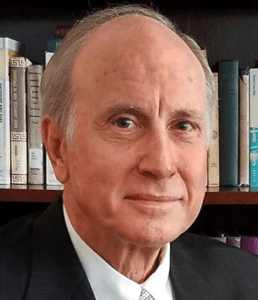A denominational worker who functioned as the Southern Baptist Convention’s point man in the ouster of churches for affirming homosexuality and the denomination’s response to sexual abuse is retiring at the end of September.

Augie Boto
August “Augie” Boto, 68, announced July 18 he is stepping down as executive vice president and general counsel of the SBC Executive Committee, according to Baptist Press.
While an attorney in Dallas in the early 1980s, Boto helped Paige Patterson organize laymen in the “conservative resurgence” movement to promote biblical inerrancy in the SBC. He was involved in the 1980 launch of the Southern Baptist Advocate, a fundamentalist propaganda tool.
Boto joined the Executive Committee as a member in 1995 and was hired in 1998 as vice president for convention policy and staff counsel under President and CEO Morris Chapman, a former pastor and past SBC president who led the organization from 1992 until his retirement in 2010.
Boto picked up the additional title of general counsel in 2004 and recently served 13 months as interim president after Frank Page stepped down due to sexual misconduct in 2018.
As staff liaison to the Executive Committee’s bylaws work group, Boto mediated the 2009 ouster of Broadway Baptist Church in Fort Worth, Texas, from the SBC, saying the congregation’s views on homosexuality were too ambiguous to ensure its “friendly cooperation” with the national body.
In 2014 the Executive Committee took similar action against New Heart Community Church in La Mirada, California, ousting the church for failure to fire its pastor after he said from the pulpit he no longer believed that all same-sex relationships are sinful.
In the process of booting Weatherly Heights Baptist Church in Huntsville, Alabama, in 2015, Boto explained how a minister performing a same-sex wedding could affect the congregation’s relationship with the SBC.
“Such individual departures from typical Southern Baptist practice or belief by a minister occur rarely, but when they do and rise to a level of general recognition by the church body and beyond, it is usually the case that either the church or the SBC takes the step of explicitly declaring a parting of ways,” Boto commented to Baptist Press. “Sometimes that parting is between the church and its minister. Sometimes it is between the church and the SBC, either one being capable of initiating the choice to separate. Which course will be followed in this instance remains to be seen.”
Last year Boto wrote the letter informing the District of Columbia Baptist Convention that its formal relationship with the SBC was coming to an end after the multiply aligned body ignored a demand to excommunicate Calvary Baptist Church in Washington for calling a married lesbian couple as co-pastors.
In 2007-2008 Boto led the process of responding to a motion from the SBC annual meeting to study the feasibility of a national database of clergy sex offenders, a year after he told the advocacy group behind the proposal he was unwilling to work with them because of their adversarial tone.
“Any such panel, to be effective, would need authority to investigate and act,” Boto said in 2007. “Baptists would never authorize or recognize such a panel if it were composed of people outside their local church.”
When the Houston Chronicle and San Antonio Express-News recently took it upon themselves to compile data on about 200 SBC ministers, volunteers and youth pastors who had been criminally convicted of abuse, however, Boto said it was a good thing.
“Your posting of it is going to heighten awareness,” Boto said in a transcript of an interview published Feb. 9. “It’s going to harden the targets.”
“I told you at the outset of this phone call that my perception of your doing a report is probably more positive than you would suspect,” Boto told journalists Robert Downen and John Tedesco. “I think sometimes people presuppose that our initial reaction to a report of Southern Baptist failure anywhere is embarrassment. I can assure you that is not my initial reaction. My initial reaction is anger.”

Debbie Vasquez at age 14, when she says her pastor first molested her. The pastor, who admits to fathering her child but says they didn’t have sex until she was 17, is still pastor of a Southern Baptist church.
While proactive with churches perceived as outside the convention’s mainstream on homosexuality, Boto has maintained over the years that the SBC is largely powerless to police sexual abuse by clergy, due to the doctrine of local-church autonomy.
“Having an investigatory body would not be a bad idea in any denomination that recognizes ecclesiastical authorities outside the local church, but Baptists are among those faiths that do not.” Boto said in an email conversation with an abuse survivor in 2007.
In another email, Boto warned against solutions that “have only the appearance of benefit.”
“I remain convinced that the answer lies not in a list, but in an increased awareness at the local level, in training of congregants, and in aggressive law enforcement,” Boto said. “I have not yet heard of a case where having the best list one can have would have made any difference. A list would only serve to offer a false sense of security, thus rendering those who depended on it more vulnerable.”
Debbie Vasquez, the woman who exchanged the emails with Boto in 2007, said it would be difficult for most churches to investigate their own pastor with an open mind.
“Just as a doctor will not operate on a family member, why would you want to put the church family in such a position?” she asked the SBC executive.
“Why can we not set up a way to keep track of those who have been convicted or have confessed or have been shown to have had inappropriate sex with minors?” Vasquez continued. “If a minister can do this and then just move to another state — as this has happened in my case — and then put at risk yet another church’s children, there should be a list and it needs to be shared with other churches to keep this from happening.”
Previous stories:
Former Southern Baptist official charged with sexual assault pleads guilty to lesser crime
Another Southern Baptist minister charged with child abuse
Camp staffer, pastor and former intern face charges amid Southern Baptist Convention abuse crisis
SBC resolution challenges Christians who self-identify as gay
SBC president calls on churches to unite against sexual abuse
